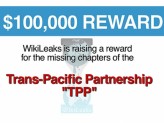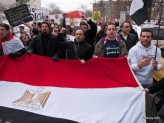WL=WikiLeaks US Embassy Cables exposure
暫定軍事政権トップのタンタウィ最高評議会議長は、ご高齢のせいか変化を嫌い、とてもじゃないけどこの人物に改革(特に経済改革)を任せるのは無理、と指摘する公電が露出した。そんなこと言われても他に代わりはいないし、どうすればいいのと人々に気をもませるためにこの公電はいま出てきたわけじゃないだろう。じゃあ、この公電の役割はなんだ。
(ところで、この記事がテレグラフのウェブサイトに上がったのが昨日(正確にはその前夜)なんですが、この件、もうあっちこっちに出回っている。BBCでもしばらく前から話題になっていた。このタイミングのずれはなんだろう。それはさておき、)
米大使館公電そのものはなにしろ25万通もあってまだ数%しか暴露されていないので、暴露の内容とタイミングは発表の場となる媒体とアサンジが恣意的に選んでいるのは明らか。こうなると、
もはや報道というより現実政治への積極的なコミットメント
と言っていいかも。てなことを考えると、じゃあ、かれら(アサンジとテレグラフ)はこれをいま公開することでどんな波及効果を期待しているのかを考えざるをえない。
思うに、人々の期待をしぼませるような老人のステイタスクオーぶりを暴露することで、エジプト軍政のお尻を叩いているのかも。その効果があったのか、改憲委員会設立に先んじて民主化支持派の若者を呼んで話を聞いたと報じられている。公電の暴露と話し合いのタイミングが予想にそっているかどうかは確認してません、念のため。
参考:
民主政治制度を機能できるかが課題-全権掌握のエジプト軍部
ウォール・ストリート・ジャーナル 2月14日(月)11時11分配信
http://headlines.yahoo.co.jp/hl?a=20110214-00000005-wsj-int
エジプト軍最高評議会、スト中止を労働者に呼び掛け
ウォール・ストリート・ジャーナル 2011年 2月15日 8:41 JST
http://jp.wsj.com/World/Europe/node_183240
上記ウォール・ストリート・ジャーナル (2月15日付け)によれば、「革命的青年委員会」と称する組織(10の野党グループから13人、非政治的グループから3人)が13日にエジプト軍最高評議会と話し合いを開始した。同委員会のシャディ・ガザリ・ハルブ(32歳、医師)によると、「若者と軍部との間には潜在的な意見の対立点が2つ」あり、それは「軍部が現在の内閣をそのまま在職させたこと、そして政治改革への工程表を野党勢力の意見を取り入れることなく発表したことだ」そうだ。「若者運動指導部は一部の閣僚を直ちに解任するよう希望しているが、軍部はまず憲法委員会を創設することを優先しているという」。この週末に再び話し合いがもたれる予定。
この委員会には例のグーグルのワエル・ゴニムも加わっており、わたしが知る限りでは、4月6日ユース・ムーブメントのアハマド・マッハーも加わっている。ゴニムさんについては、拘束を解かれた直後のエモーショナルなインタビューを聞いただけで、かれの書いたものはまだ一度も読んだことがなく、政治的にどのような考えを持っているか(いないか)さっぱりわからん。
ところで、この「革命的青年委員会」はおそらく「Revolutionary Youth Committee」ではないかと思うが、「若者運動指導部」とはなんだろう。「Youth Movement Leaders」かしら?
公電の2通目(テレグラフの記事のあとにリンクあり)によると、経済分野をはじめ、国内のありとあらゆるところに引退した元軍人が入り込んでいる。この利権を断つのは容易ではないだろう。富の再分配を実行しようと思えば公共産業や主要産業は国営化せざるを得ないが、それらの企業のトップに居座る元軍人をどうするか。課題は多い。
*
WikiLeaks: Egypt’s new man at the top 'was against reform'
The military leader charged with transforming Egypt opposed political reform because he believed that it “eroded central government power”, according to leaked US diplomatic cables.
By Christopher Hope, and Steven Swinford
11:31PM GMT 15 Feb 2011 The Daily Telegraph
Field Marshal Mohamad Tantawi, the head of the Higher Military Council that took control of Egypt last week, was also against economic reforms because they create “social instability”.
The briefings, in cables handed to the WikiLeaks website, raise questions about the field marshal’s suitability for overseeing transition to a democratically elected government.
Today The Daily Telegraph publishes on its website hundreds of leaked cables written by US diplomats in the American embassy in Cairo and sent to Washington. One, sent from Cairo to Washington in March 2008 ahead of an official visit, reports how the 76-year-old field marshal was against change.
The cable states: “Tantawi has opposed both economic and political reforms that he perceives as eroding central government power. He is supremely concerned with national unity, and has opposed policy initiatives he views as encouraging political or religious cleavages within Egyptian society.”
Field Marshal Tantawi’s role as effective interim head of state was confirmed at the weekend after President Hosni Mubarak fled from Cairo to the resort of Sharm el-Sheikh.
The communiqué also told of his opposition to economic reforms which had been pushed by President Mubarak.
The cable said: “Tantawi believes that Egypt’s economic reform plan fosters social instability by lessening GOE [government of Egypt] controls over prices and production.” He also rejected any deals regarding military equipment in return for concessions on human rights policy, the communiqué said.
Officials suggested that his age made him more conservative-minded, describing him as “aged and change-resistant”. The cable continued: “He and Mubarak are focused on regime stability and maintaining the status quo through the end of their time. They simply do not have the energy, inclination or world view to do anything differently.” Other cables show the extent to which the Egyptian armed forces have spread their influence through the country.
They claimed this power was exercised through the use of vetoes on commercial contracts due to “security concerns”.
One communiqué, sent in September 2008, said: “Contacts told us that military-owned companies, often run by retired generals, are particularly active in the water, olive oil, cement, construction, hotel and gasoline industries.” It was also suggested that “large amounts of land in the Nile Delta and on the Red Sea coast” were owned by the armed forces and seen as a “fringe benefit” in exchange for ensuring stability and security.
The cables
SCENESETTER FOR MINDEF TANTAWI'S VISIT TO THE U.S. MARCH 24-28
Ref ID: 08CAIRO524
Date: 3/16/2008 16:43
Origin: Embassy Cairo
Classification: SECRET
ACADEMICS SEE THE MILITARY IN DECLINE, BUT RETAINING STRONG INFLUENCE
Ref ID: 08CAIRO2091
Date: 9/23/2008 15:17
Origin: Embassy Cairo
Classification: SEC










